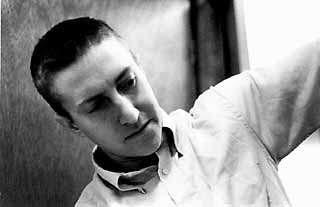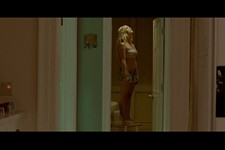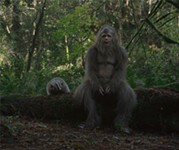Fighting Words
David Gordon Green Slams Indie Filmmakers and Snubs Cannes. Who Is This Kid, Anyway?
By Kimberley Jones, Fri., Feb. 23, 2001

David Gordon Green's been pissing people off. To be frank, the kid's got a mouth on him. It's not a particularly uncommon quality, especially for a 25-year-old -- we've all got opinions, right? Of course, most people's opinions don't get prominently displayed in The New York Times, which recently quoted Green saying that Denzel Washington's work in The Hurricane was "a phony, false performance in which I see him overdramatize every line he says." Green's also thrown some fighting words at indie directors Kevin Smith and David Mamet. But so what? He's just a kid. Why does anyone care what David Gordon Green has to say?
Well, he made a movie. Specifically, he made a movie, called George Washington, on a shoestring budget with children who had never acted before. Moreover, that movie, his first, has been one of the most loudly lauded (some say overhyped) festival films to come out in the past year. It premiered to acclaim at the Berlin Film Festival and won prizes at the Toronto and Newport festivals. New York Times critic Elvis Mitchell named it one of the best films of the year. It's earned heavy comparisons to Days of Heaven, the 1978 film by Terrence Malick (a hero of Green's), for having the same dreamy child narration and striking, epic landscapes.
Green, a native of Richardson, Texas, who attended UT for a year, wrote the screenplay for George Washington as well as directed it. It's a small story -- about neglected kids in North Carolina who survive the accidental death of a friend -- but the sweeping camera and Cinemascope used here make everything feel that much bigger: the rust and rot and gnarled wire the children play among, the public pool in which they swim, the heart pains a 12-year-old feels the first time he is dumped by a girl.
People tend to fall into two camps over George Washington: That which draws one-half in repels the other. Depending on whom you talk to, the movie is either profound or pretentious, engrossing or deadly dull, poetic or stagy. (After the 12-year-old gets the boot from his lady friend, he mews, "She had this glaze in her eyes that made me tingle all over.") George Washington is unabashedly beautiful to look at -- you could freeze any frame of this film and mount it on your wall -- but the story lazes along at a snail's pace ... which, also depending on whom you talk to, isn't always a bad thing.
People react strongly to George Washington, so it's fitting that there have been strong reactions to Green himself. But he doesn't really mind; he merely notes, with a laugh, that his loudmouth media reputation "makes Denzel Washington hate me and never want to see my movies." For now, Green is living out of his Nissan truck, raising money for his next project, a three-hour sci-fi story ("Tarkovsky kind of stuff, very philosophical and slow-moving ... not a bunch of laser beams and crap"), and staying out of trouble ... sort of. I interviewed Green over the phone from his publicist's home in New York, where he was crashing before hitting the road again. Here, he talks about his celebrated first film, takes another crack at Kevin Smith, and even gets a little giddy about Ricky Schroder movies.
The Austin Chronicle: I thought you did an amazing job capturing Winston-Salem, part industrial, part lush fields. Was that something near and dear to you since you went to school there?
David Gordon Green: I always thought it was beautiful, the rust and the decay, nature encompassing the ruins of industry. A lot of people drive by and think it's an eyesore, want to clean it up and turn it into a strip mall. I've always thought it was nice to watch wires hanging out of rust coming out of the dirt and weeds and graffiti. It's just kinda nice to me.
AC: Well, cinematically beautiful. I'm not sure how great it is to live with it.
DGG: It does have a cinematic quality. Me and my [director of photography] Tim Orr decided we were going to try to make ugly things beautiful. That's what our approach to it was.
AC: The children in George Washington use totally clean-cut language. I'm assuming that was a conscious decision.
DGG: That was one of the goals of this project. I wanted to make a distinctive movie about kids that would bring a dignity and a poetic way to the way they speak. Getting them to avoid profanity in the rehearsals and in the improv and in the writing of it made them dig a little deeper for something richer to say. And as absurd as it is at some points, it's just pretty to hear.
AC: It's totally pretty. I guess either you can appreciate the language for the poetry of it, or you can have a problem with how unrealistic it sounds. I mean, I was a filthy-mouthed kid.
DGG: [laughs] Me too. And the kids themselves are, so it's a stretch. It's just so much neater when you give them certain boundaries and parameters in the ways they can talk and when [profanity's] not allowed, it just makes them be a little smarter.
AC: How long did it take to get the film picked up for distribution?
DGG: We premiered it in Berlin in February and we got some offers, but we really got picked up in Cannes in May.

AC: You were at Cannes?
DGG: I didn't go. I don't go to that kind of stuff.
AC: You don't go on the festival circuit?
DGG: No, I really do, but I would never go to Cannes or Sundance.
AC: Too much glitz?
DGG: Yeah, I don't have a nice dress.
AC: That's a pretty good segue for my next question. You've made some strong statements coming from a first-time young pup like yourself. The Denzel Washington bit in The New York Times ...
DGG: Yeah, I hate that, cause most of that was off the record, me just having a conversation, and they think, let's have him be some spicy, young attitude-kid. It's true, but ...
AC: It's not something you had intended to have splashed all over The New York Times.
DGG: No, obviously it's not something I would have said had I thought it would be printed. But if you read anything derogatory about Kevin Smith or David Mamet, then I'm proud of it.
AC: What about the other indie directors who make highly self-conscious films?
DGG: [Kevin Smith is] the only one I don't like particularly. I respect most of them. He's the one I can't identify with in any way. I just have no idea what it's like to work in a convenience store, and it doesn't interest me either. It's that kind of mentality of dialogue that just feels really scripted; it's like it's trying to encapsulate a generation, which I wouldn't be so bold if I was going to write something ... I just feel like it's boring.
AC: But at the same time, people like Kevin Smith produced that wave of film that finally made indie films commercially viable and got people who normally wouldn't to notice independent filmmaking.
DGG: He kind of created a Special Olympics for film. They just kind of lowered the standard. I'm sure their parents are proud; it's just nothing I care to buy a ticket for.
AC: You've dogged Kevin Smith for being so overtly autobiographical. Here, you appear to have done the opposite: George Washington is about black kids in North Carolina, and you're a 25-year-old white man from Texas.
DGG: I think there's a little of me in every character I write, but I try not to make it obvious. The last thing I would ever want to make a movie about is coffee shops and convenience stores. That's not my life in any way, but as a kid that grew up in the suburbs, there'd be a pretty obvious connection there. I just want to make movies that are going to give me an excuse to knock on strange doors and figure things out and travel.

AC: What parts of you specifically are in the characters?
DGG: Words I say and things I dream and wonder about. Very kind of elemental. [pause] A lot of my childhood clothing is in it. They wear my old shirts.
AC: With influences like Terrence Malick and Robert Altman, you're making very different films from others your age. I'm wondering how your film education happened. Not in the academic sense, but when you first got plopped down in front of the TV.
DGG: Growing up, I watched a lot of movies like [Altman's] McCabe & Mrs. Miller and Nashville. They just kind of spoke to me in a different way. And then there are movies like The Champ and The Bad News Bears, which I always thought were perfect examples of movies.
AC: Was The Champ the one with Jon Voight ...
DGG: ... and Ricky Schroder.
AC: Oh my God.
DGG: Pretty good, isn't it?
AC: I haven't seen it since I was six, so I don't really remember, but The Bad News Bears is only like the coolest movie ever.
DGG: One of the greatest things that's ever happened. And nobody realizes it, and everybody thinks it's a joke when I say it, but if you go back and watch it if you get a chance, it's phenomenal.
AC: Who directed it?
DGG: Michael Ritchie, who's actually the most underrated director of the Seventies who went on to direct Fletch and Cops and Robbers. His old stuff like Smile and The Downhill Racer and The Candidate -- unbelievable Seventies work. I grew up on stuff like Never Cry Wolf and Black Stallion, like [director of the latter two films] Caroll Ballard was more my guy than George Lucas and Spielberg. A little bit different kid on the block.
AC: Most kids don't just wander into a video store and think, "Hey, McCabe & Mrs. Miller sounds really good." Did your parents have something to do with that?
DGG: No. I just wandered into a video store. I don't know, it just seemed like a good idea at the time. I mean, I watch every type of movie. I'd just go and read about a movie on the back and say "Oh, Electra Glide in Blue, sounds like a nice movie about motorcycle cops," and then I'd watch it a hundred times. That just seemed a lot more interesting to me than Top Gun.
AC: You spent a year at UT's College of Communications. How much exposure did you have there?
DGG: I was really eager to get my hands on toys and to learn new equipment, and everything there was pretty primitive and it was very grade-based. I'm a horrible student. I'm sitting there and getting Ds, trying to get into classes that you need a 4.0 to get into. It's so competitive there that I needed to go to some place where I could paint a pretty picture and then they'd let me roll a camera. I started reading about schools, and North Carolina School of the Arts popped up. Brand-new equipment, all state-of-the-art, millions of dollars invested in this program. A very small school. Luck of the draw I got in, within a class of five people. It was far more intimate, the kind of boot camp that I was looking for.
AC: Had you shot anything before?
DGG: I'd done a lot of camera work and photography and writing and drawing. I hadn't really done short films, other than Super 8. More still photography. I never had a video camera. [The popularity of digital filmmaking] is terrible. It makes me sad. I really can't sit through a DV film. Actually, I found the first great DV feature when I was in Rotterdam for the film festival last week. Jesse Peretz's new film called The Chateau. It's amazing. It doesn't look good at all, but it's the first movie to overcome that horrible look. I'm trying to go the alternate route. We're trying to shoot this movie in May in 65mm. I want to think big and pretty, not little, cheap, and ugly. ![]()
George Washington opens in theatres Friday, Feb. 23. See Film Listings for review.










